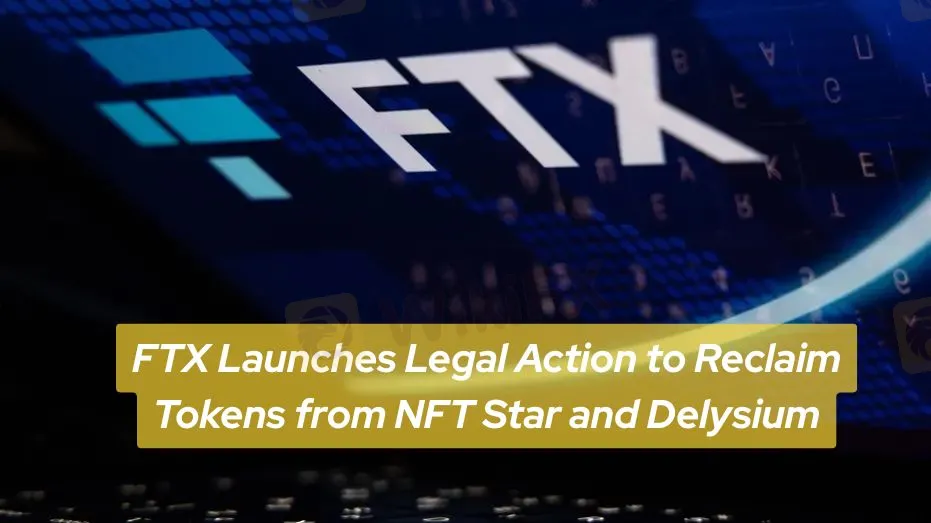FTX Launches Legal Action to Reclaim Tokens from NFT Star and Delysium
Abstract:In a renewed effort to recover digital assets for its creditors, bankrupt cryptocurrency exchange FTX has initiated legal proceedings against two firms—NFT Star and Delysium—citing breaches of token delivery agreements.

Legal Claims Tied to SAFT Agreements
FTX alleges that both defendants failed to deliver tokens promised under Simple Agreements for Future Tokens (SAFTs), a common mechanism in early-stage crypto fundraising. The agreements, made prior to FTXs collapse in late 2022, were meant to secure large allocations of tokens from upcoming blockchain projects.
After numerous attempts to secure the agreed assets through informal communication, FTX has now turned to the courts. According to filings made public on April 28, the company seeks to enforce contractual obligations and recover what it considers rightful property of the estate.
NFT Star and the SIDUS HEROES Project
The first lawsuit targets NFT Star, a metaverse-focused platform involved in the development of the SIDUS HEROES game. The dispute centers on a transaction conducted in November 2021, in which Alameda Ventures—an FTX affiliate—transferred $325,000 to NFT Star via its subsidiary, Maclaurin Investments. The payment secured 1.35 million SENATE tokens and 135 million SIDUS tokens.
Under the original terms, NFT Star was to distribute a portion of the tokens at launch in December 2021, with the remainder released in scheduled tranches through 2023. However, after FTXs bankruptcy filing, the token deliveries reportedly ceased.
Court documents claim that over 830,000 SENATE tokens and 83 million SIDUS tokens remain undelivered. FTX argues this constitutes a violation of the SAFT agreement and bankruptcy protections, and is demanding the immediate handover of the outstanding tokens plus damages.
Delysium Agreement and AGI Token Dispute
FTXs second claim involves AI platform Delysium. In January 2022, Maclaurin Investments paid $1 million for a commitment of 75 million AGI tokens. The agreement set a 12-month lock-up period followed by staggered releases.
However, Delysium allegedly modified the vesting schedule unilaterally, extending the token lock-up to four years without FTX‘s approval. In October 2023, the company publicly stated it would not transfer tokens to FTX, citing the exchange’s ongoing bankruptcy case.
Despite its refusal to deliver the tokens, Delysium submitted a claim in the FTX bankruptcy for $243,000—the amount it held on FTX‘s platform when the exchange collapsed. FTX’s legal team contends that such claims cannot proceed unless Delysium complies with its prior contractual obligations.
Broader Recovery Strategy
These lawsuits are part of FTXs broader initiative to recover lost assets through legal recourse. Since entering bankruptcy, the company has pursued multiple claims against counterparties in an effort to maximize returns for its creditors. Prior cases have included legal battles with other exchanges and blockchain ventures.
FTXs legal filings against NFT Star and Delysium underscore the complexities of token agreements and the risks surrounding enforcement in the absence of regulatory clarity. The outcomes of these cases may influence how future SAFT contracts are structured and enforced in the crypto ecosystem.
Read more

Retiree Loses RM100,000 in Fake Investment Scheme that Promised 18% Return
A 57-year-old former oil rig worker lost more than RM100,000 in savings after falling victim to an investment scam that claimed to offer Syariah-compliant returns.

FCA Introduces PASS and AI Testing to Support Financial Innovation
FCA's new measures, including PASS and AI Live Testing, aim to support financial innovation and attract international firms to the UK financial market.

Webull Canada Launches Options Trading and Advanced Tools
Webull Canada introduces options trading, Advanced Order Types, and OTC market access, offering enhanced opportunities for investors.

OANDA Expands ETF Offerings in EU for Portfolio Diversification
OANDA introduces 350+ ETFs in the EU, enhancing portfolio diversification with commission-free trades and competitive trading conditions.
WikiFX Broker
Latest News
Love, Investment & Lies: Online Date Turned into a RM103,000 Scam
Pi Network: Scam Allegations Spark Heated Debate
Broker Comparsion: FXTM vs AvaTrade
OANDA Expands ETF Offerings in EU for Portfolio Diversification
Broker’s Promise Turns to Loss – Funds Disappear, No Compensation!
FCA Warns Public About 7 Unauthorised Financial Firms
Broker Took 10% of User's Profits – New Way to Swindle You? Beware!
Webull Canada Launches Options Trading and Advanced Tools
Account Deleted, Funds Gone: A New Broker Tactic to Beware Of?
FCA Introduces PASS and AI Testing to Support Financial Innovation
Rate Calc
